英语语法总结倒装
英语倒装句语法点
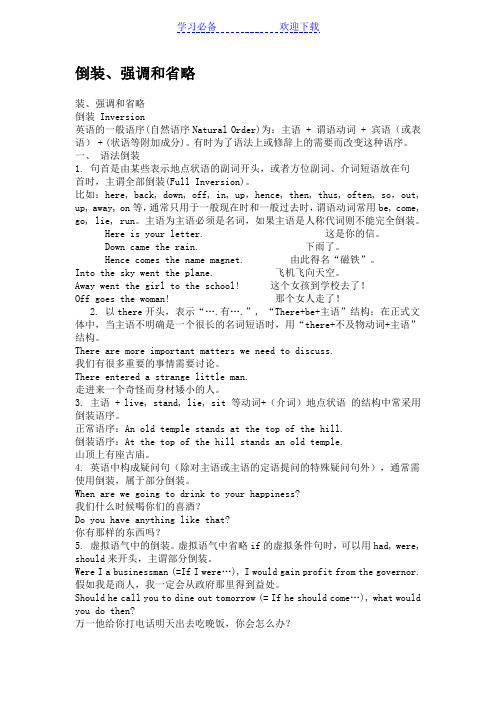
倒装、强调和省略装、强调和省略倒装 Inversion英语的一般语序(自然语序Natural Order)为:主语 + 谓语动词 + 宾语(或表语) + (状语等附加成分)。
有时为了语法上或修辞上的需要而改变这种语序。
一、语法倒装1. 句首是由某些表示地点状语的副词开头,或者方位副词、介词短语放在句首时,主谓全部倒装(Full Inversion)。
比如:here, back, down, off, in, up,hence, then, thus, often, so,out, up, away, on等,通常只用于一般现在时和一般过去时,谓语动词常用be, come, go, lie, run。
主语为主语必须是名词,如果主语是人称代词则不能完全倒装。
Here is your letter. 这是你的信。
Down came the rain. 下雨了。
Hence comes the name magnet. 由此得名“磁铁”。
Into the sky went the plane. 飞机飞向天空。
Away went the girl to the school! 这个女孩到学校去了!Off goes the woman! 那个女人走了!2. 以there开头,表示“….有….”, “There+be+主语”结构;在正式文体中,当主语不明确是一个很长的名词短语时,用“there+不及物动词+主语”结构。
There are more important matters we need to discuss.我们有很多重要的事情需要讨论。
There entered a strange little man.走进来一个奇怪而身材矮小的人。
3. 主语 + live, stand, lie, sit 等动词+(介词)地点状语的结构中常采用倒装语序。
正常语序:An old temple stands at the top of the hill.倒装语序:At the top of the hill stands an old temple.山顶上有座古庙。
倒装句语法知识点归纳总结

倒装句语法知识点归纳总结1. 在以no sooner, hardly, at no time, little, seldom, never, not only等否定词或者否定短语引导的句子中,主语和谓语部分需要倒装。
例如:- No sooner had I arrived at the station than the train left.- Hardly did we start our journey when the rain began to fall.2. 在表示地点或者时间的介词短语放在句首时,需要进行倒装。
例如:- On the corner stood a tall and handsome man.- Under the table lay a sleeping cat.3. 在表示方向的副词放在句首时,需要进行倒装。
例如:- Down the street came a group of excited children.- Up the hill ran the little girl.4. 在以“so+形容词/副词+助动词/情态动词+主语”结构引导的句子中,需要进行倒装。
例如:- So quickly did she finish the test that she had time to review her answers.5. 在以“such+名词+从句”结构引导的句子中,需要进行倒装。
例如:- Such was his love for her that he would do anything for her.总的来说,倒装句的使用可以增强语气,突出句中的某些部分,使句子更具有表现力和影响力。
在写作和口语表达中,适当地运用倒装句可以提高语言的表达能力和水平。
需要注意的是,在使用倒装句时,对于不同的语法规则和用法要有清晰的认识和理解,以避免出现错误的倒装句结构,从而影响句子的意思和表达效果。
英语倒装句语法总结
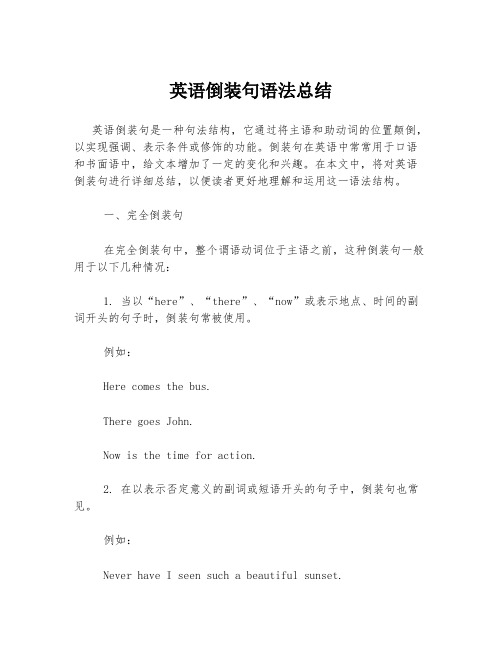
英语倒装句语法总结英语倒装句是一种句法结构,它通过将主语和助动词的位置颠倒,以实现强调、表示条件或修饰的功能。
倒装句在英语中常常用于口语和书面语中,给文本增加了一定的变化和兴趣。
在本文中,将对英语倒装句进行详细总结,以便读者更好地理解和运用这一语法结构。
一、完全倒装句在完全倒装句中,整个谓语动词位于主语之前,这种倒装句一般用于以下几种情况:1. 当以“here”、“there”、“now”或表示地点、时间的副词开头的句子时,倒装句常被使用。
例如:Here comes the bus.There goes John.Now is the time for action.2. 在以表示否定意义的副词或短语开头的句子中,倒装句也常见。
例如:Never have I seen such a beautiful sunset.Not only is she talented, but she is also kind-hearted.3. 在以“only”开头修饰状语从句的句子中,倒装句也经常使用。
例如:Only when you face your fears can you overcome them.Only in this way can the problem be solved.二、部分倒装句部分倒装句中,只将助动词或情态动词放在主语之前,而将主语与谓语动词的位置维持原状。
部分倒装句常用于以下几种情况:1. 当以否定副词“never”、“seldom”或“rarely”开头时,部分倒装句可以被采用。
例如:Never have I been so happy.Seldom does he complain about anything.2. 在以“so”或“such”引导的句子中,为了表达强调,可以使用部分倒装句。
例如:So tired was she that she fell asleep on the couch.Such is the power of love that it can conquer all obstacles.3. 在以“not”开头的句子中,为了增强否定的语气,常常使用部分倒装句。
英语语法之倒装句
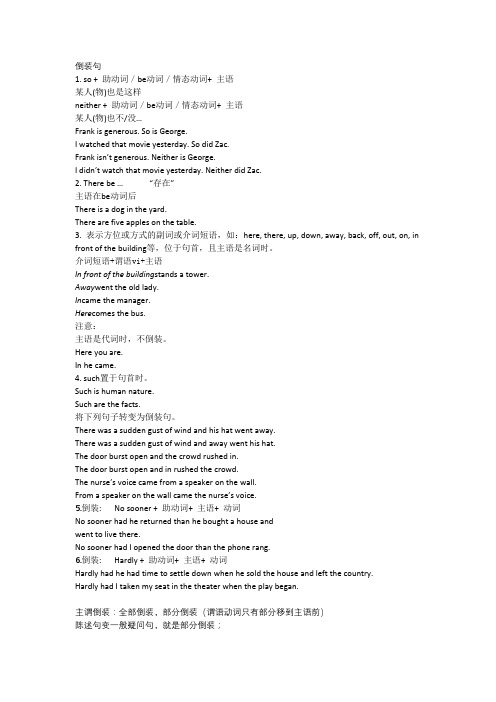
倒装句1. so + 助动词/be动词/情态动词+ 主语某人(物)也是这样neither + 助动词/be动词/情态动词+ 主语某人(物)也不/没…Frank is generous. So is George.I watched that movie yesterday. So did Zac.Frank isn’t generous. Neither is George.I didn’t watch that movie yesterday. Neither did Zac.2. There be … “存在”主语在be动词后There is a dog in the yard.There are five apples on the table.3. 表示方位或方式的副词或介词短语,如:here, there, up, down, away, back, off, out, on, in front of the building等,位于句首,且主语是名词时。
介词短语+谓语vi+主语In front of the building stands a tower.Away went the old lady.In came the manager.Here comes the bus.注意:主语是代词时,不倒装。
Here you are.In he came.4. such置于句首时。
Such is human nature.Such are the facts.将下列句子转变为倒装句。
There was a sudden gust of wind and his hat went away.There was a sudden gust of wind and away went his hat.The door burst open and the crowd rushed in.The door burst open and in rushed the crowd.The nurse’s voice came from a speaker on the wall.From a speaker on the wall came the nurse’s voice.5.倒装: No sooner + 助动词+ 主语+ 动词No sooner had he returned than he bought a house andwent to live there.No sooner had I opened the door than the phone rang.6.倒装: Hardly + 助动词+ 主语+ 动词Hardly had he had time to settle down when he sold the house and left the country.Hardly had I taken my seat in the theater when the play began.主谓倒装:全部倒装,部分倒装(谓语动词只有部分移到主语前)陈述句变一般疑问句,就是部分倒装;Only句首,部分倒装;否定词提前,部分倒装。
倒装(英语语法)

B 1.Only in this way ____ progress in your English. A. you make B. can you make C. you be able to make D. will you able to make
2. ____ can you expect to get C a pay rise. A. With hard work B. Although work hard C. Only with hard work D. Now that he works hard
A 2. Next door to ours ____, who is no less than 90. A. lives a senior(年龄大的) man B. that lives a senior man C. does a senior man live D. where lives a senior man
C 1.____ for the free tickets, I would not have gone to the films so often. A. If it is not B. Were it not C. Had it not been D. If they were not
(5) 在as/though引起的让步状 语从句中,可以把从句中的表 语、状语或动词原型提到句首, 但是主语和谓语的位置不变。 如果表语中含有不定冠词,则 要省略不定冠词。
4. Not only ____ polluted but ____ C crowded. A. was the city; were the streets B. the city was; were the streets C. was the city; the streets were D. the city was; the streets were
英语语法——倒装
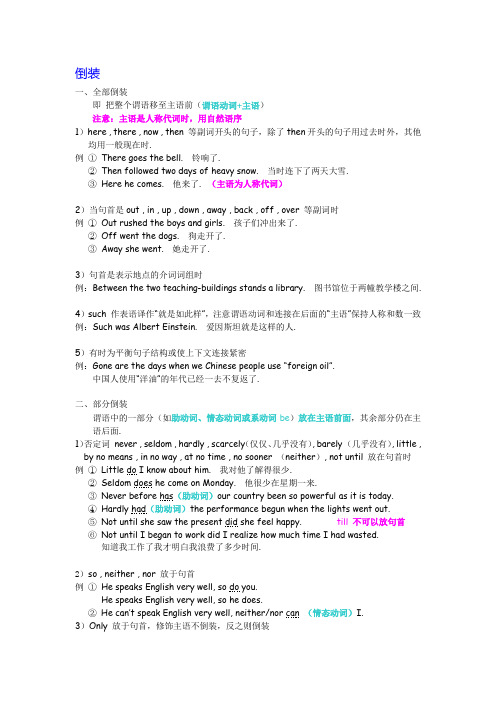
倒装一、全部倒装即把整个谓语移至主语前(谓语动词+主语)注意:主语是人称代词时,用自然语序1)here , there , now , then 等副词开头的句子,除了then开头的句子用过去时外,其他均用一般现在时.例①There goes the bell. 铃响了.②Then followed two days of heavy snow. 当时连下了两天大雪.③Here he comes.他来了. (主语为人称代词)2)当句首是out , in , up , down , away , back , off , over 等副词时例①Out rushed the boys and girls. 孩子们冲出来了.②Off went the dogs. 狗走开了.③Away she went. 她走开了.3)句首是表示地点的介词词组时例:Between the two teaching-buildings stands a library. 图书馆位于两幢教学楼之间.4)such 作表语译作“就是如此样”,注意谓语动词和连接在后面的“主语”保持人称和数一致例:Such was Albert Einstein. 爱因斯坦就是这样的人.5)有时为平衡句子结构或使上下文连接紧密例:Gone are the days when we Chinese people use “foreign oil”.中国人使用“洋油”的年代已经一去不复返了.二、部分倒装谓语中的一部分(如助动词、情态动词或系动词be)放在主语前面,其余部分仍在主语后面.1)否定词never , seldom , hardly , scarcely(仅仅、几乎没有), barely (几乎没有), little , by no means , in no way , at no time , no sooner (neither), not until 放在句首时例①Little do I know about him. 我对他了解得很少.②Seldom does he come on Monday. 他很少在星期一来.③Never before has(助动词)our country been so powerful as it is today.④Hardly had(助动词)the performance begun when the lights went out.⑤Not until she saw the present did she feel happy. till 不可以放句首⑥Not until I began to work did I realize how much time I had wasted.知道我工作了我才明白我浪费了多少时间.2)so , neither , nor 放于句首例①He speaks English very well, so do you.He speaks English very well, so he does.②He can‟t speak English very well, neither/nor can (情态动词)I.3)Only 放于句首,修饰主语不倒装,反之则倒装例①Only Tom knows the secret. (主语为Tom , only修饰Tom)②Only after she left the cinema , did she find that she had lost her handbag. 4)as 表示虽然的意思5)not only…but also , so…that , such…that 等句型中,主语倒装,从句不倒装例①Not only is she clever, but also she is kind.②Not only does John love Chinese, but he is good at speaking it.③Not only had the poor man been arrested, but(also)he had been sent to prisonas well.④So fast does light travel that it‟s difficult for us to imagine its speed.⑤So angry was Mary that she couldn‟t speak.6)happy , especially , with good reson 放在句首同样要倒装,以加强语气.例①Happy did they live tonight.②Especial in spring do I like the country. 我尤其喜欢春天的乡下.·关于nothing , none , no one 在情景对话中的几种句型:1.——“What …s on the blackboard?”——“Nothing.”(以“what”提问通常用“nothing”回答)2.——“Who is in the office?”——“Nobody(no one).”(用“who”提问的常用此)3.——“Did any of my students call me just now?”——“None.”(问句中有范围如“any of my students”, 用none 回答)4.——“Did any one call me just now?”——“No one.”(问句中的“any one”没有范围,所以用“no one”)5.——“Is there any water in the bottle?”——“None.”(“any water”指具体事物,也可表示有范围)6.——“Is there anything in the bottle?”——“Nothing.”(“anything”没有明确指出具体范围或事物,所以用“nothing”)。
英语语法-倒装(高中英语必备)
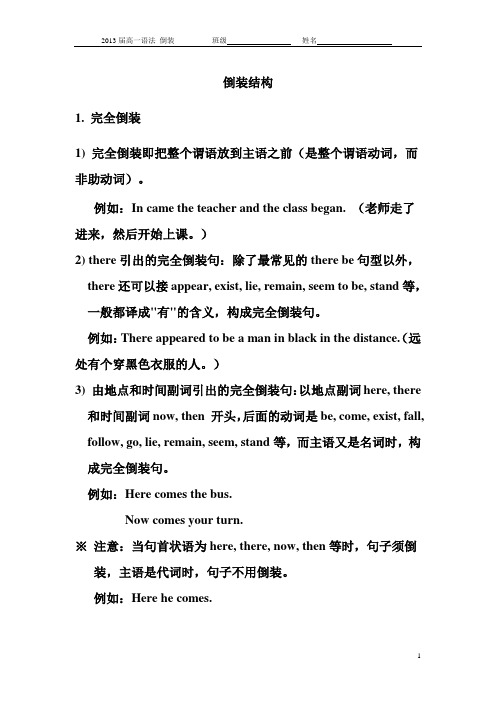
倒装结构1. 完全倒装1) 完全倒装即把整个谓语放到主语之前(是整个谓语动词,而非助动词)。
例如:In came the teacher and the class began. (老师走了进来,然后开始上课。
)2) there引出的完全倒装句:除了最常见的there be句型以外,there还可以接appear, exist, lie, remain, seem to be, stand等,一般都译成"有"的含义,构成完全倒装句。
例如:There appeared to be a man in black in the distance.(远处有个穿黑色衣服的人。
)3) 由地点和时间副词引出的完全倒装句:以地点副词here, there 和时间副词now, then 开头,后面的动词是be, come, exist, fall, follow, go, lie, remain, seem, stand等,而主语又是名词时,构成完全倒装句。
例如:Here comes the bus.Now comes your turn.※注意:当句首状语为here, there, now, then等时,句子须倒装,主语是代词时,句子不用倒装。
例如:Here he comes.4)表示运动方向的副词或地点状语置于句首,谓语表示运动的动词且主语是名词时使用完全倒装例如:Up went the plane.. the plane went up.In came the chairman.注意:如果主语是代词则不发生倒装。
例如:Out they rushed!Lower and lower he bent.5) 在直接引语之后在叙事性书面语中,直接引语后常跟asked Mary, answered John, said the old lady, grunted Peter之类的词语。
在这些词语中,动词常的主语之前。
高中英语语法——倒装句

倒装句倒装的原因:①语法原因②强调③平衡句子结构④承上启下完全倒装:整个谓语都在主语之前。
部分倒装:助动词/be/情态动词等放在主语之前。
一、完全倒装:整个谓语都在主语之前1. there be句型(特殊的全部倒装句型):其中be可换为appear, come,exist, happen,lie,live,stand等动词。
[exist/iɡ'zɪst/ vi.存在;生存]There is an experienced teacher and many lovely students in the classroom. 教室里有一位经验丰富的老师和许多可爱的学生。
There stands a temple on the top ofthe mountain. 山顶上有座庙。
2. 将here, there, now, then等地点或时间副词置于句首,且谓语动词是be, come, go, remain, lie, run等,且主语为名词时,用完全倒装。
—Is everyone here? 每个人都在这儿吗?—Not yet ... Look, there come the rest of our guests! 还没有。
看,其余的客人来了。
Here comes my list of dos and don’ts:... 下面是我的行为准则:...Here is some advice for you to follow while listening to his lecture.下面是你听他的报告时可以遵循的一些建议。
3. 表示运动方向的副词out, in, up, down, away等置于句首,谓语是表示运动的动词,且主语为名词时,句子要用完全倒装。
In the dark corner of the room, up jumped the cat and caught the mouse. 在房间黑暗的角落里,那只猫跳了上去并抓住了那只老鼠。
- 1、下载文档前请自行甄别文档内容的完整性,平台不提供额外的编辑、内容补充、找答案等附加服务。
- 2、"仅部分预览"的文档,不可在线预览部分如存在完整性等问题,可反馈申请退款(可完整预览的文档不适用该条件!)。
- 3、如文档侵犯您的权益,请联系客服反馈,我们会尽快为您处理(人工客服工作时间:9:00-18:30)。
英语语法总结倒装
根据语法要求,把谓语动词置于主语前,称为完全倒装,把助动词或情态动词置于主语前,称为部分倒装。
1.副词如:in, out, down, there, here, off, over, away, etc. 句子倒装。
(完全倒装,但主语不能是代词)
Down jumped the murderer from the tenth floor.
In came Miss Green.
特别注意:当主语是人称代词时不倒装。
Away she went! (她走了!)
Here you are! (你在这儿!)
2.only + 副词(介词短语)位于句首,句子要倒装。
Only then did he realize that he was mistaken.
Only by working hard can we succeed in doing anything.
3.well, so, often, such, few, little 放于句首,句子形成倒装。
So fine was the weather that we all went out lying in
the sun.
Well did I know him and well did he know me.
4.否定词或具有否定意义的词及词组用在句首时,句子须倒装。
此类词有:neither,nor,hardly,scarcely,rarely,seldom,not,never,not only,barely,at no time,nowhere等。
—Jack could not swim.
—Neither could Tom.
Never have I seen such a good movie.
5.as引导让步状语从句,须倒装。
(准确地说,是将需要强调的词提到as的前面。
)
Rich as he is, he spends a cent on charity.
Try as he does, he never seems able to do the work beautifully.
6.在表示祝愿的句子中。
May you make greater progress! (愿你取得更大进步!)
7.在虚拟条件句中,连词if省略时,句型要倒装,即将were, had, should等词提到句首。
Were I you, I would go abroad to take advanced study.
我要是你,就出国进修了。
Should he come tomorrow, he would help us to settle the problem.
他要是明天来的话,他会帮我们解决这个问题的。
8.百分特例重点:
Much as we may pride ourselves on our good taste, we are no longer free to choose the things we want.。
